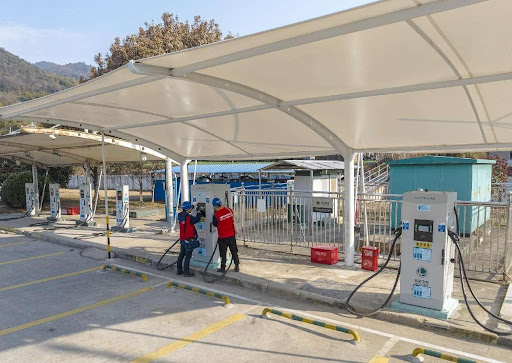By Liu Wenxin, People’s Daily
Government departments under China’s State Council handled 12,480 suggestions and proposals submitted by deputies to the National People’s Congress (NPC) and members of the National Committee of the Chinese People’s Political Consultative Conference (CPPCC) in 2023, a spokesperson for the State Council Information Office said recently.
In particular, the departments handled 7,955 suggestions, accounting for 95.7 percent of all suggestions submitted, and 4,525 proposals, 96.5 percent of all proposals submitted, said the spokesperson Xing Huina.
Xing said that the departments rolled out over 2,000 policy measures based on some 4,700 suggestions and proposals last year. This has helped solve a series of problems concerning reform and development and pressing concerns of the people. Progress has been made in the promotion of high-quality economic development, and ensuring and improving people’s livelihoods.
China’s Ministry of Industry and Information Technology (MIIT) received 1,888 suggestions and proposals in 2023, and took lead in handling 602 of them, said Xin Guobin, vice minister of the MIIT, adding that all of the suggestions and proposals had been handled as scheduled.
The ministry issued about 290 policies based on the suggestions and proposals, which promoted the development of major technologies and equipment, as well as the development of specialized and sophisticated small- and medium-sized enterprises that produce novel and unique products.
Paying high attention to green industrial development, NPC deputies and CPPCC members gave advice on optimizing industrial structure, promoting green development of industrial parks and improving energy efficiency in major industries, Xin added.
China’s Ministry of Human Resources and Social Security handled 962 suggestions and proposals last year. The ministry has introduced more than 40 policies and measures, striving to transform the suggestions and proposals into a sense of fulfillment, happiness, and security for the people, said Li Zhong, vice minister of the ministry
According to him, the policies and measures to stabilize employment have been continuously optimized, and the nationwide pooling of basic pension funds for enterprise employees has been steadily promoted. A series of policies and measures to protect the rights and interests of workers in new forms of employment have been introduced, Li added.
The social security card is a fundamental carrier of livelihood services across the country, Li noted, adding that NPC deputies and CPPCC members have shown great concern for the “one-card-for-all-services” of the social security card.
They have put forward excellent proposals and suggestions regarding enriching application scenarios and developing distinctive services, Li said.
As of the end of January this year, 1.38 billion Chinese, or 97.9 percent of the country’s population, had social security cards. Among them, 970 million had an electronic version of the card, which provided services to cardholders 15.1 billion times last year.
Vice Minister of Transport Wang Gang noted that the ministry handled 775 suggestions and proposals in 2023, covering various aspects such as comprehensive transportation network planning, transportation infrastructure construction, development of new transportation formats, and green development of rural roads and water transportation. All of these suggestions and proposals have been addressed and responded to ahead of schedule.
In recent years, the construction of supporting infrastructure for new energy vehicles has been a focus of NPC deputies and CPPCC members.
“We are accelerating the development of charging infrastructure along highways. By the end of last year, we had already built a total of 21,000 charging stations, and the network of charging infrastructure along expressways has been further improved,” said Wang.
He disclosed that this year, the ministry plans to add 3,000 charging stations and 5,000 parking spaces with charging poles at service areas of highways. The ministry encourages construction of ultra-fast charging and high-power charging facilities at service areas.
Additionally, based on the traffic characteristics during different holidays and in different regions, guidance will be provided to local authorities to offer targeted support measures, aiming to facilitate more convenient and efficient public transportation, Wang said.
“The National Health Commission handled a total of 1,470 proposals and suggestions in 2023, of which approximately 1/10 were related to primary-level healthcare. These proposals and suggestions mainly focused on strengthening investment and support for primary-level healthcare, the construction of county-level medical consortia, the development of primary-level healthcare workforce, and the enhancement of primary-level healthcare service capabilities,” said Li Bin, deputy head of the National Health Commission.
The National Health Commission has made significant progress in handling related matters by fully absorbing and adopting the suggestions and proposals.
For instance, it issued a guideline on comprehensively promoting the construction of county-level medical and health consortia, transitioning the construction of county-level medical and health consortia from a 4-year pilot phase to a comprehensive promotion stage. The commission has also established a task force for the construction of rural doctor teams, recruiting over 6,700 university graduates as rural doctors in 2023.
Starting from 2023, a three-year action plan has been implemented to promote the construction of a number of health centers, addressing deficiencies in medical emergency response, infectious disease control, and pediatrics, among others.







